The Voynich Manuscript
Tags:
- Attachments:
Replies to This Discussion
-
Permalink Reply by jack black on April 26, 2018 at 2:30pm
-
AN award-winning professor from the University of Bedfordshire has followed in the footsteps of Indiana Jones by cracking the code of a 600 year old manuscript, deemed as ‘the most mysterious’ document in the world.
Stephen Bax, Professor of Applied Linguistics, has just become the first professional linguist to crack the code of the Voynich manuscript using an analytical approach.
The world-renowned manuscript is full of illustrations of exotic plants, stars, and mysterious human figures, as well as many pages written in an unknown text.
Up until now the 15th century cryptic work has baffled scholars, cryptographers and codebreakers who have failed to read a single letter of the script or any word of the text.
Over time it has attained an infamous reputation, even featuring in the latest hit computer game Assassin’s Creed, as well as in the Indiana Jones novels, when Indiana decoded the Voynich and used it to find the ‘Philosopher's Stone’.
However in reality no one has come close to revealing the Voynich’s true messages.
Many grand theories have been proposed. Some suggest it was the work of Leonardo da Vinci as a boy, or secret Cathars, or the lost tribe of Israel, or most recently Aztecs … some have even proclaimed it was done by aliens!
Professor Bax however has begun to unlock the mystery meanings of the Voynich manuscript using his wide knowledge of mediaeval manuscripts and his familiarity with Semitic languages such as Arabic. Using careful linguistic analysis he is working on the script letter by letter.
“I hit on the idea of identifying proper names in the text, following historic approaches which successfully deciphered Egyptian hieroglyphs and other mystery scripts, and I then used those names to work out part of the script,” explained Professor Bax.
“The manuscript has a lot of illustrations of stars and plants. I was able to identify some of these, with their names, by looking at mediaeval herbal manuscripts in Arabic and other languages, and I then made a start on a decoding, with some exciting results.”
Among the words he has identified is the term for Taurus, alongside a picture of seven stars which seem to be the Pleiades, and also the word KANTAIRON alongside a picture of the plant Centaury, a known mediaeval herb, as well as a number of other plants.
Although Professor Bax’s decoding is still only partial, it has generated a lot of excitement in the world of codebreaking and linguistics because it could prove a crucial breakthrough for an eventual full decipherment.
“My aim in reporting on my findings at this stage is to encourage other linguists to work with me to decode the whole script using the same approach, though it still won’t be easy. That way we can finally understand what the mysterious authors were trying to tell us,” he added.
“But already my research shows conclusively that the manuscript is not a hoax, as some have claimed, and is probably a treatise on nature, perhaps in a Near Eastern or Asian language.”
-
Permalink Reply by Daniel James on May 2, 2018 at 3:32pm
-
I would highly suggest this video to anyone interested in Voynich
-
Permalink Reply by Tamara (little timmy) on May 18, 2018 at 4:33pm
-
I remember watching a docco on this in about 2012 amazing book manuscript.. thanks for posting this.. ill check out the youtube link xx
-
Permalink Reply by Daniel James on May 19, 2018 at 10:57am
-
Let me know what you think.
-
Permalink Reply by jack black on June 8, 2018 at 3:41am
-
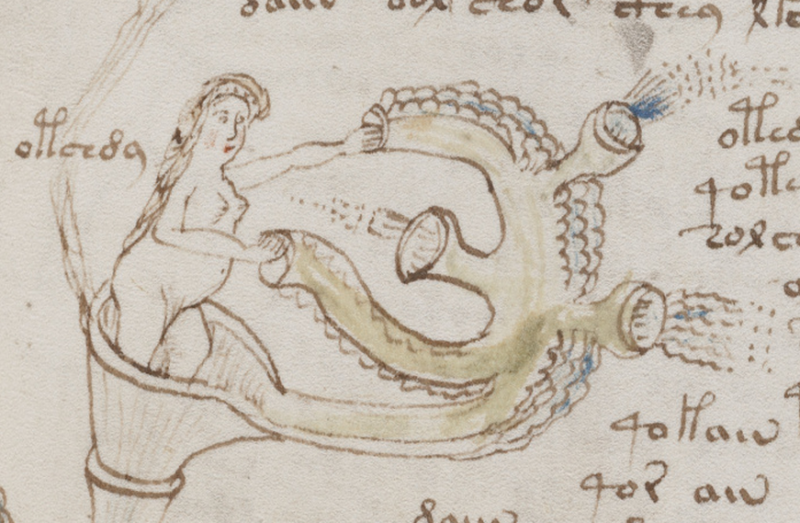

It's been owned by alchemists and emperors, before surfacing in modern times in the early 20th century, when a Polish book dealer called Wilfrid Voynich chanced upon it in 1912, unwittingly lending the mysterious book his name.
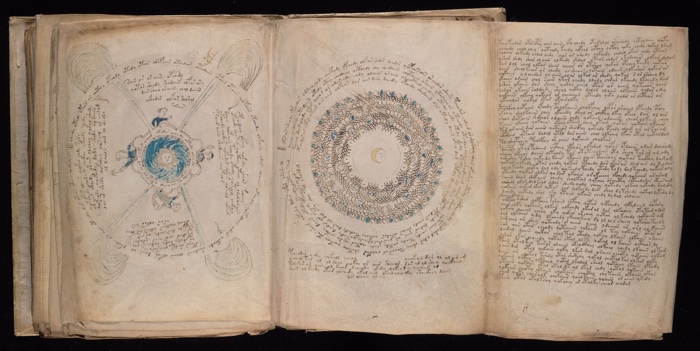 (
(Any number of cryptographers, codebreakers, and linguists have attempted to unravel the secrets of the Voynich manuscript, but the obscure code contained in its pages – along with the strange drawings of plants, symbols, and bathing women – has defied explanation.
Now, thanks to Canadian computer scientists, it looks like we may have a new lead in the case.
Researchers from University of Alberta have used artificial intelligence to decode sections of the ancient manuscript, using a technique called algorithmic decipherment to reveal the underlying, encrypted language hidden behind the strange book's words.
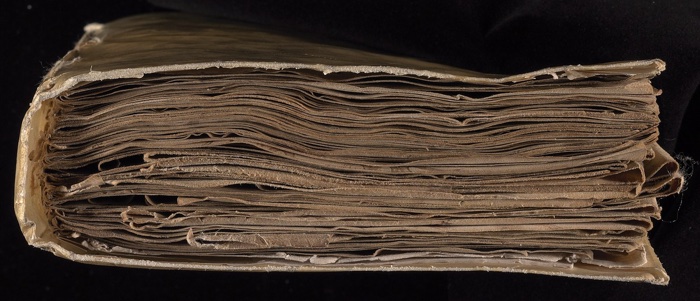 (Beinecke Rare Book & Manuscript Library)
(Beinecke Rare Book & Manuscript Library)It's not an easy thing to do, the team explains in their paper, given the number of unknowns involved.
"The Voynich manuscript is written in an unknown script that encodes an unknown language," the authors write, "which is the most challenging type of a decipherment problem."
Testing their algorithm on 380 different translations of the Universal Declaration of Human Rights, the researchers' system was able to correctly identify the language of origin 97 percent of the time.
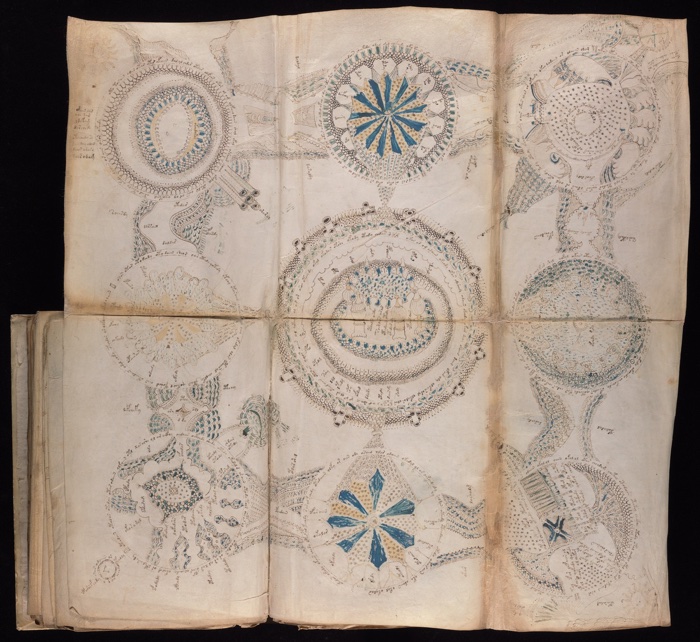 (
(Next, they focussed the AI on the pages of the Voynich manuscript, which the team suspected may be written in Arabic. The AI didn't agree, indicating Hebrew was the most likely source, edging out other potential matches that weren't commonly used for writing during the Middle Ages.
The researchers hypothesised the cipher acting on the Hebrew language could be an example of alphabetically ordered anagrams (called alphagrams), rearranging the order of letters in words, while dropping vowels.
Attempting to unscramble the the first 10 pages of the text with their AI produced mixed results.
"It turned out that over 80 per cent of the words were in a Hebrew dictionary, but we didn't know if they made sense together," says one of the team, computational linguist Greg Kondrak.
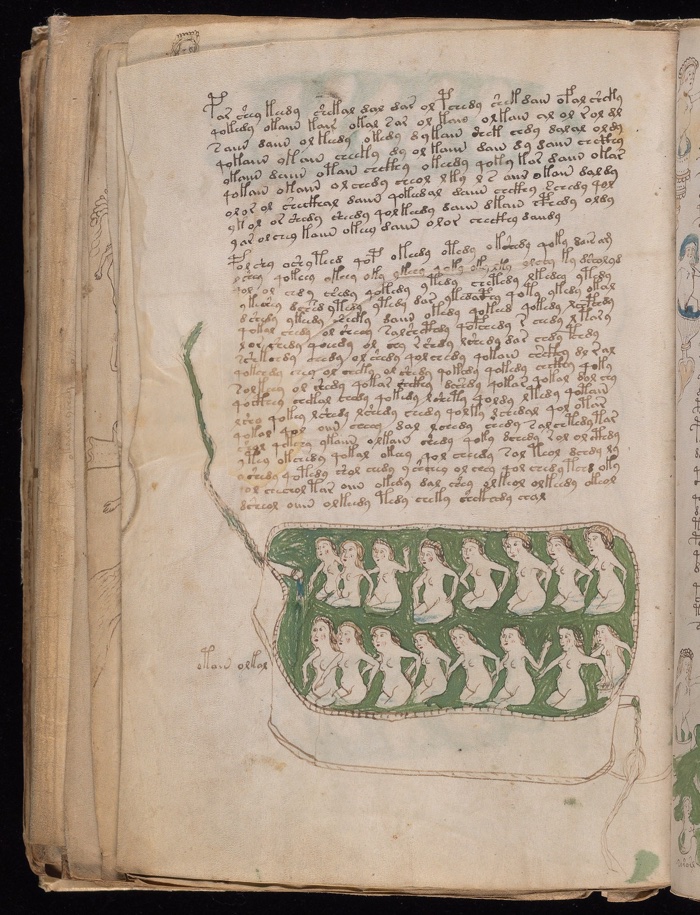 (Beinecke Rare Book & Manuscript Library)
(Beinecke Rare Book & Manuscript Library)Failing to find any Hebrew scholars who could help validate their findings, the researchers eventually resorted to using Google Translate, but even though they acknowledge there's some guesswork involved, there does seem to be a match with the text.
In the opening section of the 'Herbal' chapter of the Voynich manuscript, which contains drawing of several kinds of plants, many botany-related terms appear, including farmer, light, air, and fire.
Coincidence? Maybe not.
As for how the most mysterious book in the world starts? Well, fairly ambiguously as it turns out, but would you expect anything else?
"She made recommendations to the priest, man of the house and me and people," are the Voynich manuscript's first words, according to the AI.
Recommendations to do with herbal botany, perhaps? The team says we can't be sure.
"It came up with a sentence that is grammatical, and you can interpret it," says Kondrak. "It's a kind of strange sentence to start a manuscript but it definitely makes sense."
That said, the team acknowledges they'd need the assistance of ancient Hebrew historians to take their decoding further, and to confirm we're not conjuring algorithmically-derived misinterpretations out of the Voynich haze.
"The results presented in this section could be interpreted either as tantalising clues for Hebrew as the source language of the [Voynich manuscript], or simply as artefacts of the combinatorial power of anagramming and language models," they write.
"In any case, the output of an algorithmic decipherment of a noisy input can only be a starting point for scholars that are well-versed in the given language and historical period."
Given how much we still don't know, it's an exciting new lead for further investigations into decoding the ancient puzzle, not that everybody in the Voynich-obsessed cipher community is necessarily convinced by the team's AI-based approach.
"I don't think they are friendly to this kind of research," Kondrak told The Canadian Press, but he points out that there's a real opportunity for further discoveries here if the Hebrew hypothesis is on point after all.
"Somebody with very good knowledge of Hebrew and who's a historian at the same time could take this evidence and follow this kind of clue. Can we look at these texts closely and do some kind of detective work and decipher what can be the message?"
-
Permalink Reply by 1ehvptxi71hik on July 8, 2018 at 9:49am
-
It is indeed an enigma, and work of supreme magic, a real gift to humanity and I have long been captivated by it's mysteries contained within.
Have questions?
Need help? Visit our Support Group for help from our friendly Admins and members!
Have you?
Donations & Sponsorship
Connect
Visit The Temple
on Facebook:
Blog Posts
THELEMA vs ISLAM vs CHRISTIANITY
Posted by FRA .*. DISTURABO .*. on November 22, 2025 at 5:38am 0 Comments 0 Likes
The Black Rite
Posted by Heth Lee (李) on November 7, 2025 at 4:00pm 0 Comments 0 Likes
Channeled Fairy Wisdom of the Jewels of Truth Series on a Fae Journal Entry, Rebirths of the Fae, & Cosmology of the Astral Realms
Posted by Atrayo on November 6, 2025 at 2:43pm 0 Comments 1 Like
Heth Lee: Genesis
Posted by Heth Lee (李) on October 27, 2025 at 2:00pm 0 Comments 0 Likes
Channeled Angelic Wisdom of the Jewels of Truth Series on Divine Inheritance, Totality of the Self, & Paradoxical Actions by Faith
Posted by Atrayo on October 26, 2025 at 10:57am 0 Comments 1 Like
The North Star
Posted by Heth Lee (李) on October 24, 2025 at 8:00am 0 Comments 0 Likes
Heth Lee: Exodus
Posted by Heth Lee (李) on October 22, 2025 at 5:00am 0 Comments 0 Likes
The Sith Lord
Posted by Heth Lee (李) on October 20, 2025 at 11:00pm 0 Comments 0 Likes
The Weapon Master
Posted by Heth Lee (李) on October 18, 2025 at 11:30pm 0 Comments 0 Likes
Channeled Angelic Wisdom of the Jewels of Truth Series on Heart, Pure Heart, and the Immaculate Conception
Posted by Atrayo on October 16, 2025 at 5:39am 0 Comments 1 Like
Penultimate
Posted by Heth Lee (李) on October 10, 2025 at 12:00am 0 Comments 0 Likes
HOW ABOUT A GAME OF CARDS ?
Posted by FRA .*. DISTURABO .*. on October 9, 2025 at 4:30am 0 Comments 0 Likes
THE GOLDEN DAWN OF A NEW DAY WAS YESTERDAY
Posted by FRA .*. DISTURABO .*. on October 7, 2025 at 9:14pm 0 Comments 1 Like
DMV
Posted by Heth Lee (李) on October 4, 2025 at 1:00pm 6 Comments 0 Likes
The Pale Horse
Posted by Heth Lee (李) on September 30, 2025 at 6:30pm 0 Comments 0 Likes
PRINCIPALITIES & POWERS - DOMINIONS & THRONES - 36 DECAN MNEMONICS
Posted by FRA .*. DISTURABO .*. on September 27, 2025 at 11:00pm 0 Comments 1 Like
390 - LIBER 220 - 1:57
Posted by FRA .*. DISTURABO .*. on September 27, 2025 at 7:35pm 0 Comments 0 Likes
PHOENICIAN / VALUES
Posted by FRA .*. DISTURABO .*. on September 26, 2025 at 4:05pm 0 Comments 1 Like
The Atlantean
Posted by Heth Lee (李) on September 25, 2025 at 6:30am 0 Comments 0 Likes
Channeled Angelic Wisdom of the Jewels of Truth Series on Astral Holy Light & Sound and Binary Dominion Inversion
Posted by Atrayo on September 25, 2025 at 1:05am 0 Comments 1 Like
NOVEMBER AWARENESS
Videos
© 2025 Created by Bryan
Powered by
![]()